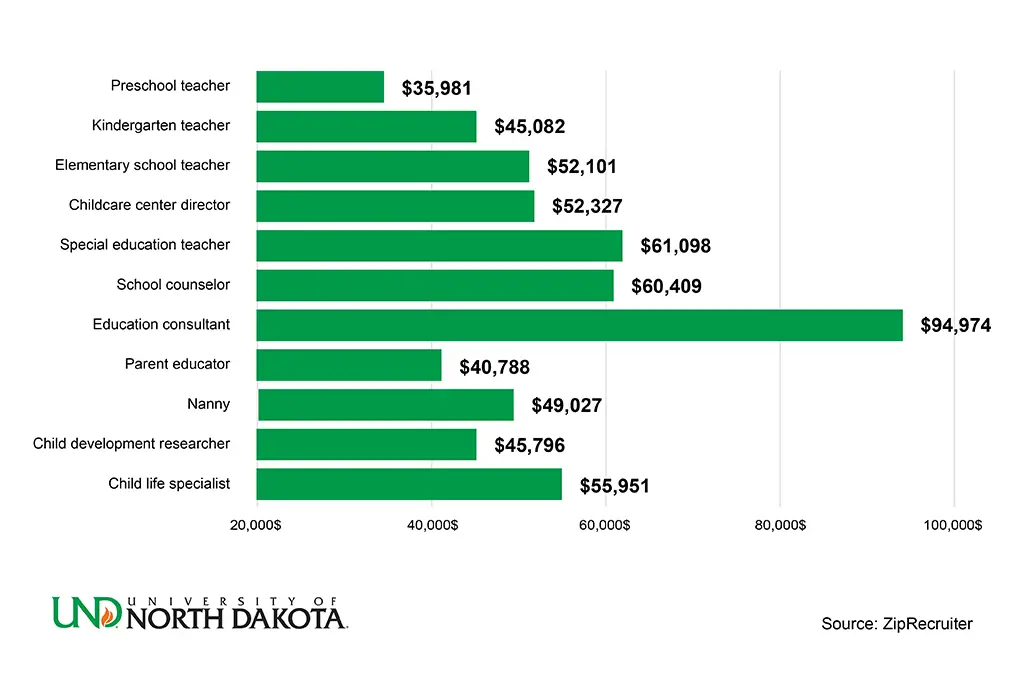
What Can You Do With an Early Childhood Education Degree?
With an early childhood education degree, you can pursue a variety of roles, from teaching young children to leading educational programs or even working in specialized areas like child development research or family education.
Request Information
Dr. Maria Montessori, one of the most influential figures in early childhood education, revolutionized how we understand childhood development, emphasizing that the first six years of life are the most critical. In her book The Absorbent Mind, she wrote, "The most important period of life is not the age of university studies, but the first one, the period from birth to the age of six... At no other age has the child greater need of intelligent help." This highlights the importance of these early years when children are forming their intelligence but, most importantly, developing the foundation for their entire being. The role of those who work in early childhood education is to nurture this stage of life.
Early childhood education is undeniably an important field. But what can you do with an early childhood education degree exactly? Well, the possibilities are vast—ranging from teaching in early learning environments to leadership roles in education and even extending to opportunities in healthcare settings like hospitals, where specialized support is crucial for young children.
10 Careers in Early Childhood Education
There are many early childhood education degree jobs you can pursue, some directly after obtaining a bachelor's degree and others for which you need additional education and training. However, each option benefits greatly from the knowledge and skills gained through such a degree, allowing you to make a meaningful impact on children's development.

Preschool Teacher
As a preschool teacher, you have a significant impact on society as it's your responsibility to begin educating children—the future. It's your duty to create a structured and engaging environment where the students can start to develop their skills and knowledge regarding literacy and numeracy. You must also craft lesson plans that encourage exploration and critical thinking and allow children to learn through play, hands-on activities, and guided instructions.
In addition to teaching academic content, as a preschool teacher, you also focus on the children's overall development. You observe and assess each child's progress in order to identify potential emotional or developmental challenges as early as possible. Then, you work with parents and other educational professionals to address these needs.
Average salary: $35,981 per year
Education requirements: You need at least a bachelor's degree in early childhood education or another related field.
Kindergarten or Elementary School Teacher
Kindergarten and elementary school teachers also help shape children's minds during some of their most formative years. In such roles, you must deal with much more than the introduction to the basics of reading, writing, and mathematics. You must help the kids nurture their social skills, teach them how to work with others, and generally aid in building their confidence and curiosity.
Once again, you often collaborate with the parents as well as other specialists in order to make sure that each and every child gets the support that they need. It's a role that demands patience, flexibility, and creativity to fulfill the day-to-day responsibilities and challenges you might face.
Average salary: $45,082 per year (kindergarten teachers); $52,101 per year (elementary school teachers)
Education requirements: At least a bachelor's degree in early childhood education or a related field, with some states also requiring a major in a specific subject area for public schools. Depending on your state, you may also need to obtain a traditional teaching license or a specific early childhood education license.
Childcare Center Director
As a childcare center director, you oversee the operations of early learning facilities. You deal with everything from managing staff and budgets to implementing curriculum standards. In short, you are responsible for the center's success.
In addition to administrative duties, you also serve as a sort of communicator between the children's parents and the teachers. This way, you help build trust and ensure that children's developmental needs are met. Through your understanding of early childhood education, you help direct the overall educational approach of the center.
Average salary: $52,327 per year
Education requirements: A bachelor's degree in early childhood education, business management, or a related field is often required. Some employers might also require a background in teaching.
Special Education Teacher
Special education teachers are the ones who work with the students dealing with a range of learning, emotional, mental, or physical disabilities. Such a role requires expertise regarding specialized teaching strategies and tools as well as overall flexibility in adapting general education lessons in order to meet the special needs of each student.
Special education teachers also develop Individualized Education Programs (IEPs) for each student, which outline specific learning goals and methods of support. The job requires patience, creativity, and a deep understanding of different conditions and learning styles.
Personal experience can also sometimes provide additional insight. As Den Bolda, an alumnus of UND's online master's program in Special Education, explained, "I was in special education as a student, so I know what that is like. As a teacher, I can relate to students sometimes better because I know what they are struggling with." This type of connection can enhance a teacher's ability to empathize with and support their students.
Average salary: $61,098 per year
Education requirements: To become a special education teacher, you'll first need to earn a bachelor's degree in education, with a focus on special education or a related field. Following this, you'll need to gain hands-on experience through student teaching internships, and most states also require special education teachers to obtain licensure. While not always mandatory, a master's degree in special education can provide further training and expertise.
| Video |
|
|---|
School Counselor
School counselors are integral to a student's overall development, including their academic achievement and emotional well-being. Often, these professionals work one-on-one with students to address personal challenges like mental health issues, family dynamics, or peer conflicts.
School counselors collaborate with teachers, administrators, and parents and are key advocates in creating programs that promote a positive school culture, including anti-bullying campaigns, stress management workshops, and peer mentorship initiatives. Therefore, this role demands a deep understanding of human psychology, excellent communication skills, as well as the ability to deal with complex situations with sensitivity and professionalism.
Average salary: $60,409 per year
Education requirements: You typically need a master's degree in school counseling or a related field, which covers topics like counseling theories, human development, and ethics. If you plan to work with younger students, graduating with an early childhood education minor or having a background in early childhood education can be particularly beneficial. In addition to your degree, most states require supervised internships or practicums in school settings, followed by state licensure or certification.
Education Consultant
Education consultants are professionals who advise schools, educational institutions, and sometimes even directly the students' families on various strategies that can help them improve teaching, learning, and overall educational outcomes for the students. In this role, you would assess existing curricula, policies, and educational practices to provide recommendations that help with effectiveness.
The role requires strong analytical skills and expertise in education trends. Additionally, it's important to have excellent communication abilities in order to collaborate with others and drive improvements across educational settings.
Average salary: $94,974 per year
Education requirements: To become an education consultant in early education, you generally need a bachelor's degree in early education or a related field. Practical experience as a teacher or administrator is important, as it provides the background needed to advise schools effectively.
Parent Educator
As a parent educator, you would essentially be teaching parents how to be their child's first educator. In this role, you work directly with families to provide support and guidance in regards to their children's development and overall well-being. You would be responsible for equipping parents with tools and strategies that help them improve communication, manage behavioral issues, and encourage learning at home.
This role requires strong communication skills, an understanding of child development, and the ability to tailor guidance to meet the various needs of different families.
Average salary: $40,788 per year
Education requirements: You typically need a bachelor's degree in early childhood education, social work, or a related field. Some roles may require a master's degree or relevant certification through programs like Parents as Teachers (PAT).

Nanny
A nanny is a childcare professional who provides ongoing, personalized, one-on-one care for children. They typically work in a home setting and are responsible for tasks like feeding, bathing, and organizing activities that promote their development.
In addition to ensuring the safety and well-being of the children, a nanny often takes on various responsibilities that extend beyond basic care. This can include preparing nutritious meals, organizing engaging activities, and taking the children on outings to parks, museums, or other educational spots. Nannies also help support the child's learning and development. This can involve helping with homework, tutoring in specific subjects, or reinforcing skills such as reading, writing, and math through fun, educational activities.
Average salary: $49,027 per year
Education requirements: While there are no formal education requirements to become a nanny, having a degree in early childhood education can be highly beneficial. This background equips nannies with a deeper understanding of child development, learning milestones, and effective teaching strategies, allowing them to better support the children's growth.
Child Development Researcher
Child development researchers study how children grow and develop across cognitive, emotional, social, and physical domains. Their work aids our understanding of childhood development and informs educational practices, parenting strategies, and public policies.
As a child development researcher, one would conduct studies, collect and analyze data, and observe children in various settings to understand the factors that influence their development. This research is essential for identifying developmental milestones, diagnosing learning or behavioral challenges, and creating interventions that support healthy growth.
Average salary: $45,796 per year
Education requirements: To become a child development researcher, you'll need a master's or doctorate degree in child development, developmental psychology, educational psychology, or a related field. Experience in early childhood education can be helpful, especially when focusing on young children's development.
Child Life Specialist
Early childhood education isn't confined to classrooms, homes, or care centers—it can also open doors to careers in settings like hospitals. Child life specialists, for example, work primarily in healthcare settings, helping children and their families through the emotional and psychological challenges associated with various illnesses, injuries, or hospitalization.
They provide therapeutic play, education, and emotional support to help children understand medical procedures and cope with their fears. They also offer guidance to the rest of the family in communicating effectively with healthcare providers and making difficult decisions.
Average salary: $55,951 per year
Education requirements: You'll typically need a bachelor's degree in child life, early childhood education, psychology, or a related field. Many employers also require certification from the Child Life Certification Commission (CLCC), which involves completing a supervised internship and passing an exam. Some roles may prefer or require a master's degree for advanced knowledge and expertise in child development and therapeutic practices.
Choosing the Right Career Path
Choosing between the various early childhood education careers can be challenging, as many roles seem similar yet differ significantly in day-to-day responsibilities and long-term growth potential. When deciding which path is right for you, think about your strengths, interests, and long-term goals.
For example, if you prefer working directly with children and teaching them, preschool or kindergarten teacher positions might be ideal. On the other hand, if you're more interested in dealing with broader educational policies or leading teams, jobs like childcare center director or education consultant may be a better fit.
Remember, some jobs for early childhood education can lead to more advanced roles over time. For instance, working as a teacher or parent educator might eventually prepare you for leadership positions in administration or curriculum development. The key is to choose a role that not only matches your current skills but also aligns with your vision for future growth in the field.
Conclusion
An early childhood education degree is incredibly versatile, offering a wide range of career opportunities that allow you to make a significant impact on children's development. While the focus is always on early childhood, how you approach it—whether through teaching, creating educational systems, or working with families—offers diverse pathways for your career.
At UND, we provide the tools and education you need to succeed in this field, offering
programs like the bachelor's degree in Early Childhood Education, the master's in Early Childhood Education M.S., and the Early Childhood Education certificate, all online. Every great mind starts with a great educator, and that could be you!
FAQs
Definitely! Such a degree opens doors to a variety of rewarding career opportunities focused on helping develop and shape young minds.
The highest-paying jobs in early childhood education are typically leadership roles or high-level research positions. The added responsibility and expertise required for these positions often translate to higher salaries compared to direct teaching roles.